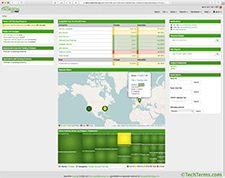NMS
Stands for "Network Management System." An NMS is a system designed for monitoring, maintaining, and optimizing a network. It includes both hardware and software, but most often an NMS refers to the software used to manage a network.
Network management systems provide multiple services. These include, but are not limited to:
- Network monitoring - NMS software monitors network hardware to ensure all devices are operating correctly and are not near or at full capacity. Alerts can be sent to network administrators if a problem is detected.
- Device detection - When a new device is connected to the network, the NMS detects it so that it can be recognized, configured, and added to the network. This is also called device provisioning.
- Performance analysis - An NMS can gauge the current and historical performance of a network. This includes the overall performance of the network as well as individual devices and connections. For example, the NMS may detect aspects of a network where throughput is nearing the maximum bandwidth available. The data can be used to optimize the flow of traffic and recommend the addition of new hardware if needed.
- Device management An NMS can provide a simple way to manage multiple devices from a central location. It may be used to configure a device or modify settings based on the performance analysis. Examples include activating specific network ports on a switch or implemeting bandwidth throttling for certain devices.
- Fault management - If a device or section of a network fails, an NMS may be able to automatically reroute traffic to limit downtime. This action may be performed on the fly or may be accomplished using a set of preconfigured rules. When a fault occurs, a network alert or notification is usually sent to one or more network administrators.
Why use an NMS?
In small networks, such as a residential or home network, an NMS is not necessary. However, it is important for any large network, such as those found in enterprise configurations. Server farms, data centers, and corporate networks may have hundreds or thousands of connected devices. It is important to have a central network monitoring system in place to manage the devices. An NMS provides and efficient way to locate, update, repair, and replace network equipment as needed.
 Test Your Knowledge
Test Your Knowledge